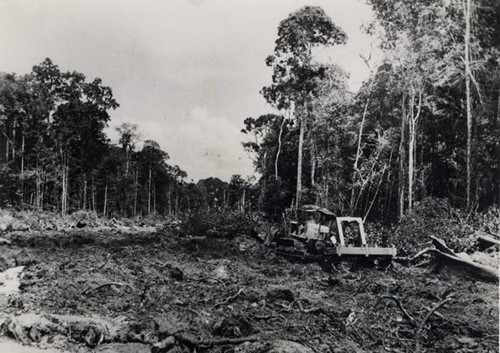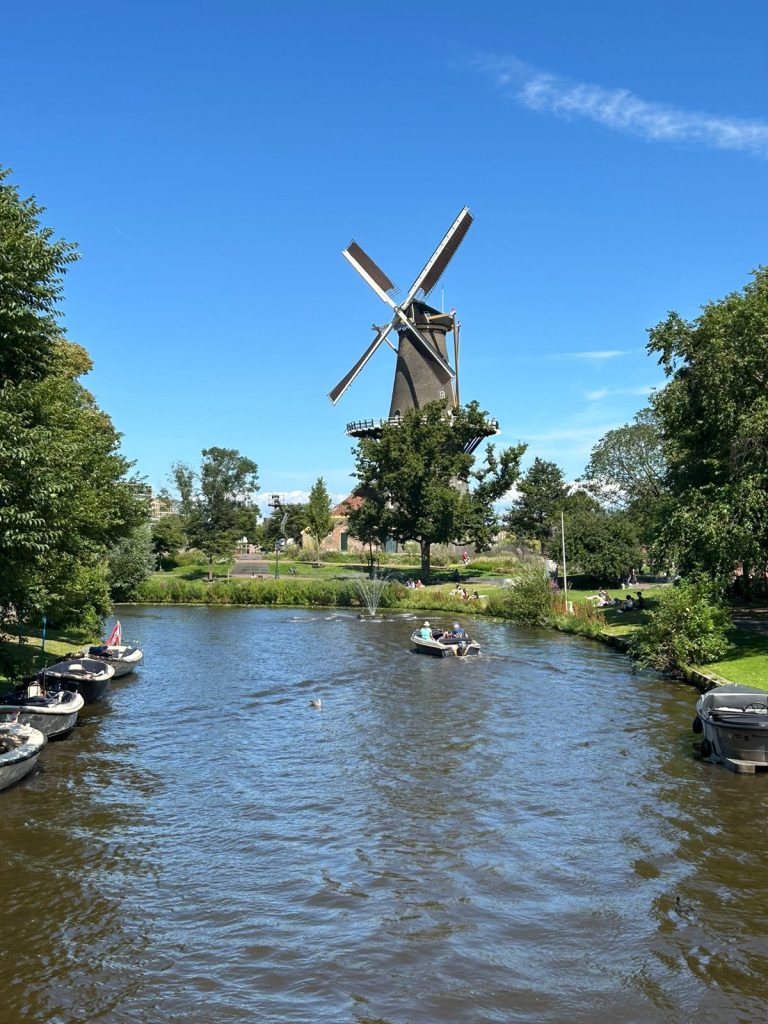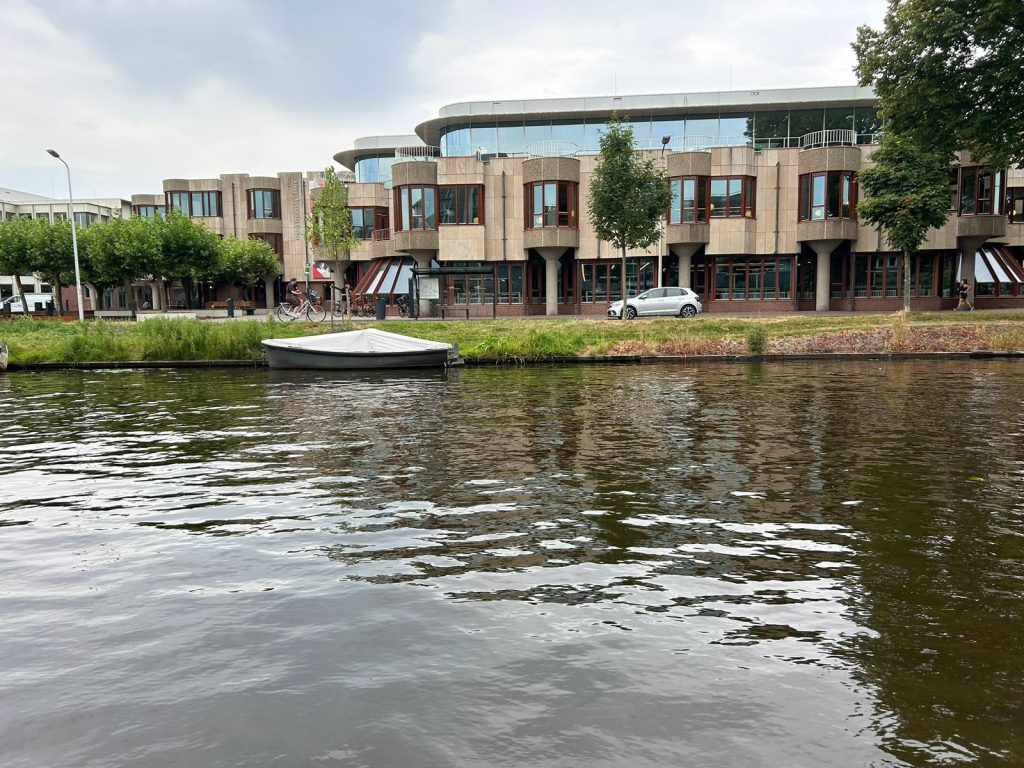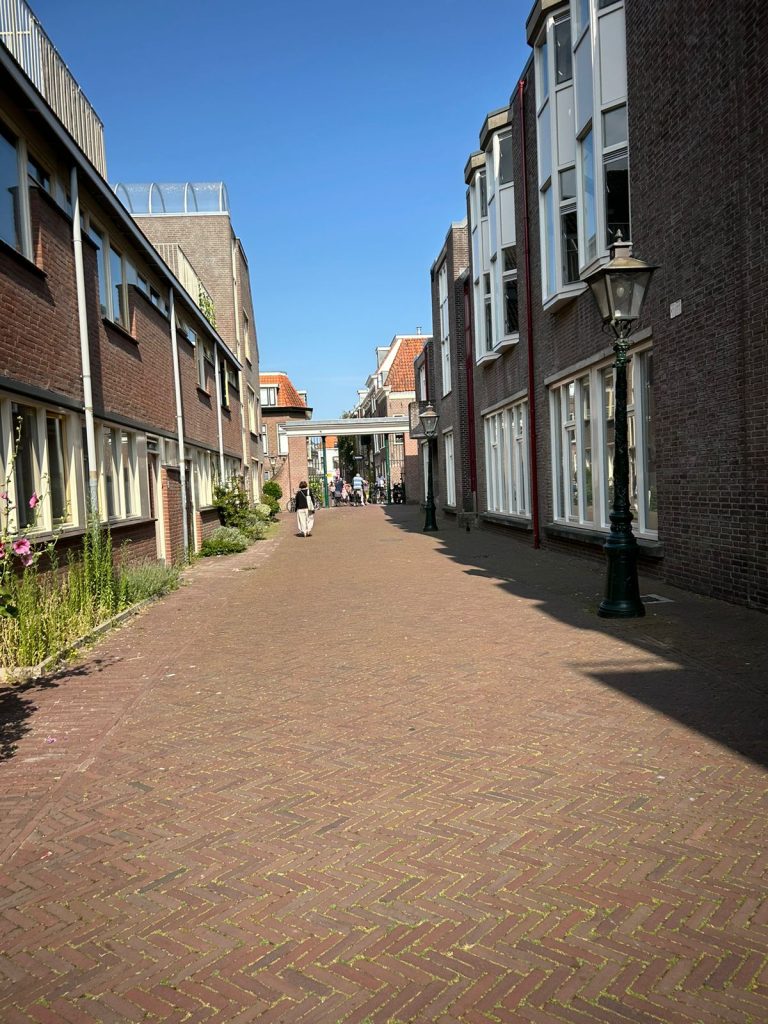by Runavia Mulyasari, Gadjah Mada University
My name is Runavia Mulyasari and I am a visiting researcher at Leiden University from July to September 2024. As part of my research project on the new frontiers of Indonesia, I would like to share my experience of being seconded to the MARS project. In this project, I try to understand the role played by intermediaries in creating space for migrants in oil palm frontiers. In addition, I am using the lens of the frontier to reflect on my experience of being on secondment in Leiden, the Netherlands.
Understanding Kalimantan Frontiers from Archives
Reading the records in the Leiden Libraries, it became clear to me that the process of frontierisation in Kalimantan was a familiar process. According to the archives, frontierisation started in the colonial era, where it started through land acquisition, making the area the old frontier. The old frontiers have several characteristics, such as the areas being considered empty land, having no rules, and being rich in natural resources. The process of frontierisation has continued in many resource-rich regions, such as Kalimantan, with massive land transformation. The current frontierization in Kalimantan has different characteristics from the old frontier, where the situation is very dynamic with many actors, making Kalimantan a so-called ‘new resource frontier’ (De Jong, Knippenberg, & Bakker, 2017). The other characteristics of the areas are lack of laws and regulations (Nasir Gintu, 2024), high mobility and migration practices, high competition that often leads to conflict and violence (Rahmadian, 2023), and to some extent leads to the presence of many actors, including the intermediary actors such as a go-between.

Source: KITLV 45072 (accessed on 3rd of September 2024)
Kalimantan’s new frontier came just after the implementation of decentralisation in 2001, which led to the distribution of power from the central government to the regional government. In Kalimantan, this shift has triggered massive land transformation into oil palm, leading to many actors joining and competing in the new spaces, such as the government, multinational companies, NGOs, migrants, academics, local people, and intermediary actors such as brokers, middlemen and intermediaries, or what I have called go-betweens. These different actors come from different backgrounds and places, not just the people who live around the plantation who are interested in these new frontiers but also people from outside the plantations. It makes the frontier areas into a new space for migration.

The presence of the plantations in Kalimantan is creating a new mechanism of life on the plantations (Li & Semedi, 2021). Driven by the demand for labour in the plantation system. It creates the imagination of better income and life while participating in the oil palm ecosystem. This has further encouraged people to move and migrate to this new oil palm frontier. Many migrants see oil palm as a place of hope and opportunity. However, the integration of migrants into this new oil palm frontier is not entirely organic. In most cases, the migration process takes place through the role of go-betweens. Intermediaries play an essential role not only in the process of mobility but also in the adaptation of migrants. Migrants who use the role of go-betweens are often the ones who successfully enter the new oil palm frontier.
Leiden as an educational frontier

The conditions of frontierization in the hinterland of Kalimantan can also be found in different areas, such as in Leiden, the Netherlands, where I did my secondment. I flew from Indonesia to Leiden as a guest researcher. From a migration perspective, I was considered a contemporary migrant. As Tezcan (2024) mentioned, contemporary migration patterns today are predominantly temporary instead of permanent. Recent patterns of migration flow indicate that immigrants predominantly return to their country of origin or engage in circular migration (Favell, 2008). As an ‘educational’ contemporary migrant, I considered Leiden one of education’s frontiers. The idea of frontier comes from imagining the richness of academic resources and knowledge, where many actors interact to join and compete in this educational institution. By considering that richness, I define frontier education as a place and space to produce material and immaterial educational resources to support individuals or groups of intellectuals. In this sense, Leiden is a place of education-rich resources regarding valuable archives and centres of knowledge, especially for social sciences. Besides that, Leiden also has rich natural scenery and historical places, making it one of the most beautiful cities in the Netherlands and even popular among tourists. The combination of a knowledge centre and tourist centre makes Leiden one of the frontier places for academic migrants and tourists.


Leiden University, The Netherlands. Source: Author (August, 2024)
The process of living in frontier Leiden was challenging. As a frontier of education, Leiden has received 6,313 bachelor’s students (23% foreign nationals) and 5,915 master’s students (36% foreign nationals) who come from 120 Nationalities (www.universiteitleiden.nl). The data showed that academic migrants come from around the world to this city. The competition for students or researchers willing to study or work in Leiden started when they were in their country of origin (i.g., competing to enter Leiden University and looking for a scholarship). This academic competition has also shifted into other life challenges to become a ‘migrant’ in Leiden.
One example is finding accommodation, where the number of rented houses is limited. In this limitation of house resources, a go-between with a specific role of housing provider can be found. The go-betweens specific to housing providers appear in formal and informal forms. To deal with this limitation of housing resources, the academic migrants need to use the roles of go-betweens to get housing. Even Leiden University’s website also posted several ways to find housing websites from the legal go-between, both from non-profit housing organisations (room.nl/DUWO) or other commercial housing agencies or search engines (such as kamersleiden.nl, hospihousing.com, studentcity-leiderdorp.nl., and so on). However, the limitation of rent housing has forced the education migrants to access through different informal go-betweens by creating new connections and networks. To have access to these informal go-betweens, the education migrants start to join a network of housing through student groups or nation groups. Many educated migrants had no room or house to rent when they arrived in the Netherlands. They were forced to pay high prices to access rented houses, choosing to stay outside Leiden or sometimes preferring to rent ‘informal’ housing where they could not register as permanent addresses. It made the educational migrant’s situation very challenging while they started to adapt to the new cultures.
I also experienced a brief example of the frontier situation in Leiden. However, by understanding the strength of social relationships among the Indonesians living abroad, I start the room competition process by using the roles of informal go-betweens. My decision to take the risk of using the role of informal go-between is partly due to my agency, knowledge, and personal network. I connect with people who often rent their house through a friend who was taking a role as a go-between. Since my go-between and I are in the same network in Indonesia and graduated from the same university, through this dyadic relationship, I asked her for a shake to find accommodation for me in Leiden. My go-between started to collect the housing information, negotiate with the house owner, and ensure that the owner agreed to accommodate me during my stay. This process was followed by her giving me the number of the room owner, and in a week, I found a room by using my connection to my go-between.
Finding accommodation was relatively easy since I knew someone who could help me, but it was challenging for others without a good network. My networks worked well, and while I found people who could be my go-between, she started to allow me to smoothly adapt as a migrant in Leiden while finding a place for my stay. Through my go-between connection, which extended into her bubble of networks, I quickly found a place to stay, a bike to ride, and friends to connect with. However, it is very challenging for other students and researchers who have yet to learn how the Leiden frontier works. Many students and researchers need help finding housing, creating networks, and struggling with new academic atmospheres.
Meanwhile, in daily life outside of university, I used my networks to create new networks in Leiden. The process was smooth when I knew people, and using my close ties as a fictive kin to protect me in Leiden made me a ‘successful’ migrant in becoming a ‘Leiden resident’.
In the end, living in Leiden as one of the frontiers of education emphasises that not only structure and networks help people to live in this city. However, it is also necessary to show the agency and individual capabilities to create new relationships and maintain the networks. At least for my experience as a migrant, both network and agency become crucial to help me enter and become deeply involved in the migrant world in Leiden. Starting with relationships and living with others, asking and keeping curious about everything, are making me, as a migrant, gradually shift to be a Leiden resident for the past two months. In this sense, trying to become and participate in the Leiden society is also a form of connecting with the right go-betweens.
Concluding remarks Living in Leiden Frontier
Researching migration in different contexts and conditions with my places of secondment in Leiden makes me reflect that the migration process was not easy, especially for migrants who never leave their place in their entire lives. The red line between my research topic and my position as a researcher in Leiden is the migration process in the context of new frontiers. Shifting identity, adapting to culture, and connecting to people and things always puts a migrant between home and a new place. The values and norms of the migrants keep shifting between the past and present to support their translation process and shape their positionality. Within this interpretation, migration is about temporality. In the end, migration is always about becoming and living in between the place made by the ideas of hope, potential, and opportunity.
References
De Jong, E. B., Knippenberg, L., & Bakker, L. (2017). New frontiers: an enriched perspective on extraction frontiers in Indonesia. Critical Asian Studies, 49(3), 330-348.
Favell, A. (2008). The new face of East–West migration in Europe. Journal of ethnic and migration studies, 34(5), 701-716.
Li, T. M., & Semedi, P. (2021). Plantation life: corporate occupation in Indonesia’s oil palm zone. Duke University Press.
Nasir Gintu, M. (2024). National law and regional riches: Contesting natural resources in East Kalimantan, Indonesia (Doctoral dissertation, Nijmegen: Radboud University Press).
Rahmadian, G. (2023). Heart in violence: Everyday violence under the oil palm canopy of a Dayak community in West Kalimantan, Indonesia. Doctoral dissertation: Radboud University.
Tezcan, T. (2024). The role of identification, intergroup contact, and group discrimination in shaping return and circular migration intentions: Recent Turkish immigrants in Germany and the Netherlands. Group Processes & Intergroup Relations, 0(0). https://doi-org.ezproxy.leidenuniv.nl/10.1177/13684302241253217
Acknowledgement
Before I end my post, I thank Lund University for providing me with the opportunity and funding to conduct research in Leiden within the MARS project. I am grateful to Leiden University, especially Prof. Bart Barendgert, who is willing to host me in Leiden. I am also thankful to Chekhros Kilichova (MARS project). Finally, I thank Prof. Pujo Semedi and the Faculty of Cultural Sciences, Universitas Gadjah Mada, for their support.

